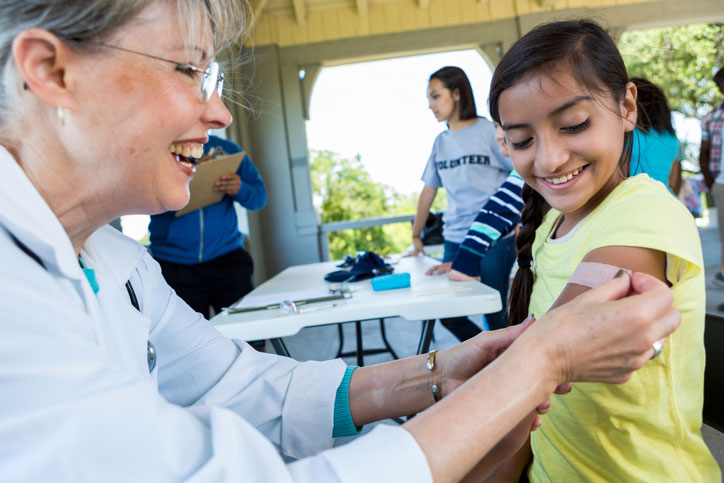Written by Sam Medley

Way back in 2020, the federal government launched the Families First Coronavirus Response Act, a piece of legislation that, among other things, required state Medicaid programs to keep people enrolled throughout the pandemic. To promote compliance, legislators promised federal funding to states that adopted the act.
But as the pandemic seemingly wound down, Florida officials purged more than 500,000 Medicaid enrollees from the system. Estimates say that roughly half of those suddenly left without insurance are children. But that’s only the beginning of Florida’s recent healthcare woes.
Around the same time, the average wait time for helplines set up to help families navigate the state’s Medicaid system was about 32 minutes, putting the state out of compliance with federal guidelines. More than a third of callers hung up before getting answers. To make matters worse, investigations found that calls from Spanish-speaking callers were disconnected at alarmingly high rates.
As a result, many Floridians have no healthcare coverage and are left without answers as to why — a particularly frightening reality for people with chronic diseases and anyone who doesn’t have a few thousand extra dollars laying around for medical emergencies.
But while devastating, this isn’t the only issue in Florida’s healthcare system. But no matter where an issue starts, healthcare social workers are there to help people get answers and get the care they deserve.
A Day in the Life of Florida’s Healthcare Social Workers

Broadly speaking, healthcare social workers help people navigate the maze that is the American healthcare system. They can work for hospitals, government health departments, senior living centers, community clinics, and just about anywhere else where people go for healthcare services.
But across all settings, healthcare social workers typically share the same core responsibilities such as:
- Connecting patients to financial support services
- Assessing patients’ psychological, social, and environmental needs
- Educating patients and their loved ones about treatment options, at-home care, and their rights as patients
- Providing counseling to both patients and caregivers
- Coordinating services between multiple providers (physicians, specialists, nutritionists, mental health professionals, etc.)
- Helping medical professionals make discharge plans
And while healthcare social workers can work under that exact title, they can also take on a number of different roles that focus on different aspects of patient support. Here’s a few to consider along with the important roles they play in Florida’s healthcare network:
Florida’s Licensed Clinical Social Workers (LCSWs) in Healthcare
One of the most flexible roles a healthcare social work can take on is that of a Licensed Clinical Social Worker (LCSW). LCSWs have the training and legal authority to diagnose mental health disorders and provide advanced psychotherapeutic treatment. But their career choices aren’t limited to mental health work exclusively. LCSWs can help patients at hospitals, hospice care providers, and specialty clinics cope with the emotional scarring that comes with end-of-life decisions and life-changing diagnoses.
For example, because of Florida’s massive (and growing) senior population, the state’s LCSWs often work for memory care communities and the many Florida Area Agencies on Aging that oversee senior care across the state. Because of their mental health training, LCSWs are adept at helping seniors combat and cope with social isolation, loss, dementia, and other late-life issues.
Florida’s Case Management Social Workers in Healthcare
For many marginalized Floridians, medical issues are only the beginning. They might need financial assistance, emergency shelter following domestic violence, home health services, or just some emotional support. In the healthcare sector, social workers often serve as case managers who coordinate services for patients across medical and mental health specialist services, and beyond, identifying other resources they may need for everything from housing to substance use counseling and support.
And though it doesn’t always show up in the official job description, social workers in healthcare settings serve as a resource for everyone in the mix – from nursing staff and physicians to patients and their families.
Expert case management services are particularly important to Florida’s immigrant population. Community Health of South Florida specializes in connecting immigrants to primary care, behavioral health, and insurance professionals who literally and figuratively speak the patient’s language. Considering recent legislation that requires Florida hospitals to ask about immigration status, fostering health equity and finding compassionate providers is more important than ever.
Florida’s Community Program Managers and Administrators in Healthcare
Instead of working directly with patients, many of Florida’ healthcare social workers become community program managers, administrators, and policy experts. These professionals are largely responsible for assessing community-wide needs and marshaling the resources required to meet them.
As of 2024, some 280 health practitioner shortage areas exist in Florida. That means more than 6 million Floridians live in areas without enough medical or mental health professionals. And those that have enough practitioners in the area may not be able to afford them — over 2.5 million Floridians are uninsured. Fortunately, health organizations in all sectors are rising to the occasion.

The Florida Department of Health has programs in place to make healthcare more accessible to rural communities, researching the state’s health issues, and building resilience into community healthcare such that it can manage large scale situations, from natural disasters to possible pandemics. Nonprofits, regional healthcare networks, and even federal agencies like the CDC contribute to these efforts and run their own programs — and they all need talented administrators to oversee them.
Getting Into Healthcare Social Work in Florida with a Specialized MSW
Legally speaking, you don’t need a Master of Social Work and state licensure to become a healthcare social worker in Florida. However, medical social work is a complex field. One moment, you might be helping someone understand their insurance benefits. The next, you could be helping an entire family cope with the sudden loss of a loved one.
As a result, you’ll find that many healthcare social work positions in Florida and other states require applicants to have a Master of Social Work (MSW).
That being said, though, there are three main types of MSW programs in Florida: clinical programs, macro/leadership programs, and dual degree programs. All are designed to prepare you for specific types of roles in Florida’s healthcare system.
Clinical MSW Programs for Behavioral Health Roles
If becoming a Licensed Clinical Social Worker (LCSW) seems like the path for you, you’ll be working with the Florida Board of Clinical Social Work, Marriage & Family Therapy and Mental Health Counseling to earn that license. Fortunately, the majority of accredited MSW programs in Florida offer clinical degree tracks.
To prepare you for clinical licensure, clinical MSW programs include classes on:
- Psychopathology.
- Social work research.
- Evidence-based practice.
- Clinical practice with individuals, groups, and families.
While all of Florida’s clinical MSW programs can help you become an informed, compassionate LCSW, a couple are especially well-equipped for helping students enter the healthcare sector.
At Florida Gulf Coast University in Fort Myers, you can earn a clinical MSW and then pursue a graduate certificate in medical social work. The certificate program includes classes on trauma-informed care, bereavement, aging, and a number of other healthcare-focused topics.
Through the University of Central Florida’s clinical MSW program, you can take electives like Social Work in Health Settings, Medications in Social Work Practice, among other classes that can help you apply clinical social work skills to healthcare settings.
If you want to serve a specific group like children, seniors, or veterans, plenty of Florida’s clinical MSW programs offer graduate certificates in those specific areas.
MSW Programs for Community Health and Leadership Roles
If you feel called to the community health or leadership side of things, you may want to consider an MSW program in Florida that focuses on macro-level social work (social work focused on community-wide issues). While not as common as clinical programs, Florida is home to a number of excellent macro and community-oriented programs.
Macro-level MSW programs offer classes on:
- Community needs assessment and resource development
- Program evaluation
- Policy analysis.
- Social service program design and management.
- Social service administration.
At Florida Agricultural and Mechanical University in Tallahassee, you can earn an MSW focused on macro-level social work while also taking electives on rural social work and community empowerment, both of which are perfect for medical social workers in areas that lack healthcare resources.
Florida State University (which has campuses in Tallahassee and Panama City as well as an online option) offers both a clinical and leadership degree concentration. On the leadership path, you’ll learn about personnel management, group and community development, and advanced policy analysis. While not focused strictly on medical social work, this is a great option for social service leaders of all kinds.
Dual Degree Programs
If you see yourself working in the public health and/or government health sector, consider pairing your MSW with a Master of Public Health (MPH). Doing both degrees separately takes about four years, but some schools offer dual degree programs that let you earn both in about three years (less if you hold a BSW and qualify for an Advanced Standing MSW program).
In addition to social work classes, students in MSW/MPH degree programs take classes on:
- Epidemiology: the study of how diseases affect and are transmitted through communities.
- Biostatistics: a combination of statistics and biology that’s useful for measuring public health issues.
- Health program management.
- Public health education.
- Environmental health.
Florida International University in Miami has an MSW/MPH program that allows students to concentrate in either Health Promotion and Disease Prevention or generalist public health practice. The MPH portion of the program is available completely online.
The University of South Florida in Tampa also offers an MSW/MPH program. Their program’s unique in that it prepares students for individual and community-level social work practice.
The Next Step to Consider for Florida’s Medical Social Workers: Earning Professional Certifications in Healthcare Social Work
Once you get your foot in the door, you can pursue professional certifications to take on higher-level roles. While professional certifications aren’t necessarily required for most healthcare social work positions, they can demonstrate your commitment to and authority in the field.
Your first option is getting certified through the National Association of Social Workers (NASW). The NASW is the nation’s leading social worker organization so their certifications carry some weight. Their Certified Social Worker in Health Care (C-SWHC) credential is the obvious choice, but you can also get certified in:
- Gerontology.
- Hospice and palliative care.
- Substance use disorders.
- Military social work.
- Child and family welfare.
Typically, you need two years of experience to qualify for NASW certifications. However, some certifications have clinical and advanced versions. For the clinical versions, you’ll need to be an LCSW in good standing.
If you’re in administration, policy, or macro social work, you may also want to consider the Certified Master Social Worker (CMSW) certification from the Florida Board of Clinical Social Work, Marriage & Family Therapy and Mental Health Counseling. To qualify, you’ll need to take MSW-level classes on topics like program evaluation and community organization, complete three years of field experience, and pass a standardized exam. That may sound like a lot, but it’s the only government-offered macro-level social work credential offered in Florida, so earning it puts you in a small, highly-trained class of professionals.
Where Healthcare Social Workers Work in Florida

Despite (or maybe because of) Florida’s healthcare-related issues, there’s no shortage of job opportunities for healthcare social workers. In fact, the US Bureau of Labor Statistics says Florida has the fourth largest healthcare social work workforce in the nation at about 10,000 professionals. And according to Projections Central, this sector is expected to grow by about 15% by 2032. That’s equivalent to roughly 1,200 job openings per year.
A big source of these jobs come courtesy of Florida’s major healthcare systems: AdventHealth, HCA Florida, and BayCare Health Systems amongst others. These private healthcare providers run hospitals, mental health clinics, cancer treatment centers, and a number of other specialty facilities that require healthcare social workers.
If you’re more interested in public and community health, the Florida Department of Health is only one option. The Agency for Persons with Disabilities, Department of Elder Affairs, and the Children’s Medical Services and their community partners all work together and with local partners to provide and coordinate services for the at-risk people they serve. Additionally, the CDC is very much involved with bolstering and researching Florida’s healthcare services and needs.
However, these opportunities are just the beginning. In 2024, Florida legislators passed the Live Healthy Act which funds multiple programs designed to expand the healthcare workforce and improve access for millions of Floridians. In the long run, though, it’s up to the state’s healthcare social workers to help their communities and their colleagues navigate this new era and push for more reforms that put health first.
